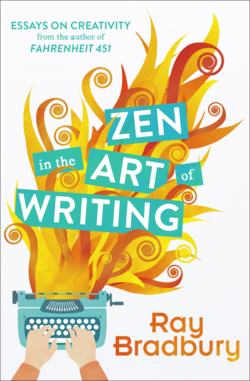Читать книгу Zen in the Art of Writing - Рэй Брэдбери, Ray Bradbury, Ray Bradbury Philip K. Dick Isaac Asimov - Страница 10
HOW TO KEEP AND FEED A MUSE
ОглавлениеIt isn’t easy. Nobody has ever done it consistently. Those who try hardest, scare it off into the woods. Those who turn their backs and saunter along, whistling softly between their teeth, hear it treading quietly behind them, lured by a carefully acquired disdain.
We are of course speaking of The Muse.
The term has fallen out of the language in our time. More often than not when we hear it now we smile and summon up images of some fragile Greek goddess, dressed in ferns, harp in hand, stroking the brow of your perspiring Scribe.
The Muse, then, is that most terrified of all the virgins. She starts if she hears a sound, pales if you ask her questions, spins and vanishes if you disturb her dress.
What ails her? you ask. Why does she flinch at the stare? Where does she come from and where go? How can we get her to visit for longer periods of time? What temperature pleasures her? Does she like loud voices, or soft? Where do you buy food for her, and of what quality and quantity, and what hours for dining?
We might start off by paraphrasing Oscar Wilde’s poem, substituting the word ‘Art’ for ‘Love’.
Art will fly if held too lightly,
Art will die if held too tightly,
Lightly, tightly, how do I know
Whether I’m holding or letting Art go?
For ‘Art’ substitute, if you wish, ‘Creativity’ or ‘The Subconscious’ or ‘Heat’ or whatever your own word is for what happens when you spin like a firewheel and a story ‘happens.’ Another way of describing The Muse might be to reassess those little specks of light, those airy bubbles which float across everyone’s vision, minute flaws in the lens or the outer, transparent skin of the eye. Unnoticed for years, when you first focus your attention on them, they can become unbearable nuisances, ruptures in one’s attention at all hours of the day. They spoil what you are looking at, by getting in the way. People have gone to psychiatrists with the problem of ‘specks’. The inevitable advice: ignore them, and they’ll go away. The fact is, they don’t go away; they remain, but we focus out beyond them, on the world and the world’s ever-changing objects, as we should.
So, too, with our Muse. If we focus beyond her, she regains her poise, and stands out of the way.
It is my contention that in order to Keep a Muse, you must first offer food. How you can feed something that isn’t yet there is a little hard to explain. But we live surrounded by paradoxes. One more shouldn’t hurt us.
The fact is simple enough. Through a lifetime, by ingesting food and water, we build cells, we grow, we become larger and more substantial. That which was not, is. The process is undetectable. It can be viewed only at intervals along the way. We know it is happening, but we don’t know quite how or why.
Similarly, in a lifetime, we stuff ourselves with sounds, sights, smells, tastes, and textures of people, animals, landscapes, events, large and small. We stuff ourselves with these impressions and experiences and our reaction to them. Into our subconscious go not only factual data but reactive data, our movement toward or away from the sensed events.
These are the stuffs, the foods, on which The Muse grows. This is the storehouse, the file, to which we must return every waking hour to check reality against memory, and in sleep to check memory against memory, which means ghost against ghost, in order to exorcise them, if necessary.
What is The Subconscious to every other man, in its creative aspect becomes, for writers, The Muse. They are two names for one thing. But no matter what we call it, here is the core of the individual we pretend to extol, to whom we build shrines and hold lip services in our democratic society. Here is the stuff of originality. For it is in the totality of experience reckoned with, filed, and forgotten, that each man is truly different from all others in the world. For no man sees the same events in the same order, in his life. One man sees death younger than another, one man knows love more quickly than another. Two men, as we know, seeing the same accident, file it with different cross-references, in another part of their own alien alphabet. There are not one-hundred elements, but two billion elements in the world. All would assay differently in the spectroscopes and scales.
